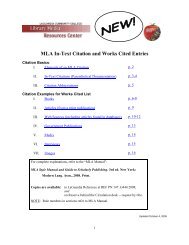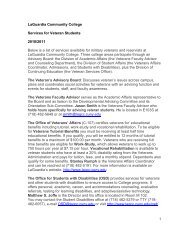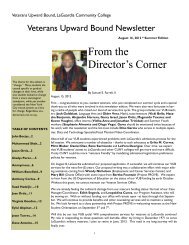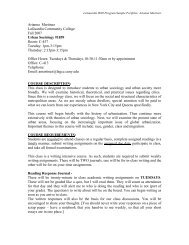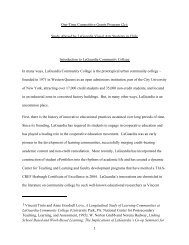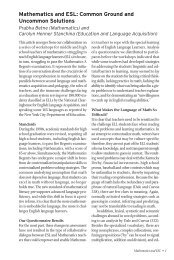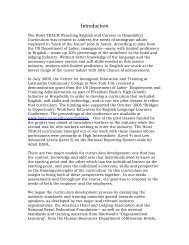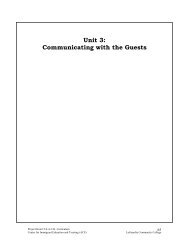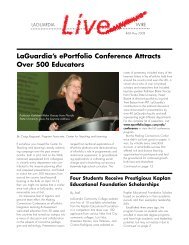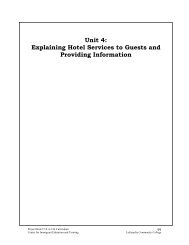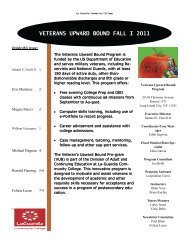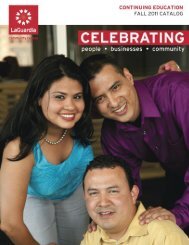COURSE INDEX - LaGuardia Community College
COURSE INDEX - LaGuardia Community College
COURSE INDEX - LaGuardia Community College
Create successful ePaper yourself
Turn your PDF publications into a flip-book with our unique Google optimized e-Paper software.
Humanities Department<br />
ity, the possibility of science revealing the nature of conscious<br />
experience, the nature of thinking and perception and how they<br />
relate to the world we think about and perceive, and the ability of<br />
computers to think or perceive in the same way we can.<br />
Prerequisite: ENC/ENG101, HUP101<br />
modify their articulation, voice and intonation patterns. Through<br />
role-plays and discussions, it will provide students with opportunities<br />
to use oral language in a variety of contexts in which they<br />
have to reason, solve problems and relate ideas.<br />
Pre- or Corequisite: HUC101 or HUC104 or HUC108<br />
HUP275 Landmarks in Philosophy<br />
3 credits; 3 hours<br />
This capstone course engages students in the study of key philosophical<br />
works by such major philosophers as Plato, Aristotle,<br />
Augustine, Aquinas, Descartes, Hume, Kant, Marx, Russell,<br />
Wittgenstein, and Sartre chosen from the following periods:<br />
ancient, medieval, modern, contemporary. Building on their previous<br />
familiarity with these thinkers, students will develop a<br />
coherent framework for understanding philosophy, and explore<br />
and synthesize the central themes of philosophical study.<br />
Prerequisites: HUP101, two other Philosophy courses<br />
Speech Communication<br />
HUC101 Fundamentals of Speech Communication<br />
3 credits; 3 hours<br />
This course is designed to introduce the student to a broad understanding<br />
of human communication behaviors. Students will learn<br />
basic principles and concepts of interpersonal communication,<br />
small group communication and public speaking. Topics include:<br />
What is communication? What are the types of communication?<br />
How does communication affect our perceptions and selfconcept?<br />
What are verbal and nonverbal communication? What<br />
is active listening? How do we prepare and organize an effective<br />
presentation?<br />
Prerequisite: CSE099<br />
Pre- or Corequisite: ENA/ENG/ESA099/ENC101<br />
HUC104 Voice and Diction<br />
3 credits; 4 hours (3 lecture, 1 lab)<br />
This course is designed for students who wish to improve their<br />
speaking skills. Course content will include the basic theory of the<br />
production of speech and voice, study of the speech and hearing<br />
mechanism, and a survey of the sound system of American Standard<br />
English. Students will participate in an analysis of their<br />
speaking skills and use drills and varied group activities to modify<br />
their voice and articulation patterns.<br />
Prerequisite: CSE099, ENA/ENG/ESA099/ENC101<br />
HUC106 Public Speaking<br />
3 credits; 3 hours<br />
This course is designed to provide the student with a critical<br />
understanding of, and increased skill in, formal public speaking.<br />
In addition to examining oral rhetoric theory, students learn and<br />
practice skills in topic selection, research, organization, delivery<br />
and criticism of speeches.<br />
Prerequisite: CSE099, ENA/ENG/ESA099/ENC101<br />
HUC108 Communication in a Professional Setting<br />
3 credits; 3 hours<br />
This course will develop students’ knowledge of oral communication<br />
principles and theories in professional settings. Topics will<br />
include types of organizational communication, obstacles to effective<br />
communication, effective leadership behavior, and nonverbal<br />
communication. Students will learn about assertive behavior,<br />
conflict resolution, effective listening skills and persuasive presentations.<br />
Prerequisite: CSE099<br />
Pre- or Corequisite: ENA/ENG/ESA099/ENC101<br />
HUC109 Persuasion and Debate<br />
3 credits; 3 hours<br />
This course builds on the basic oral skills developed in Public<br />
Speaking (HUC106) and is designed to provide the student with<br />
the rhetorical and analytical skills necessary for persuasive debate.<br />
The student will be introduced to different styles of debate. The<br />
student will also learn to prepare a debate brief and to use flow<br />
sheets to structure refutation and rebuttal. In addition, the role of<br />
persuasion and debate in a democratic society will be explored.<br />
Prerequisite: HUC101<br />
HUC111 Interpersonal Communication<br />
3 credits; 3 hours<br />
This course will introduce students to the processes and principles<br />
of interpersonal communication in the context of developing relationships.<br />
Students will examine how the characteristics of each<br />
individual (e.g., gender, age, power, culture) and the characteristics<br />
of the environment where the relationship develops can affect<br />
the way we communicate. The various communication patterns<br />
used in relationship formation and relationship disengagement<br />
will also be explored.<br />
Prerequisite: HUC106<br />
HUC105 Language Application Workshop<br />
1 credit; 3 hours (1 lecture, 2 labs)<br />
This course is designed for students who wish to continue to<br />
improve their English speaking skills. It will enhance the content<br />
of other speech communication courses by helping students<br />
HUC112 Small Group Communication<br />
3 credits; 3 hours<br />
This course is designed to familiarize students with fundamental<br />
principles of small group communication practices in various<br />
group settings. Topics include: group development, leadership,<br />
148



